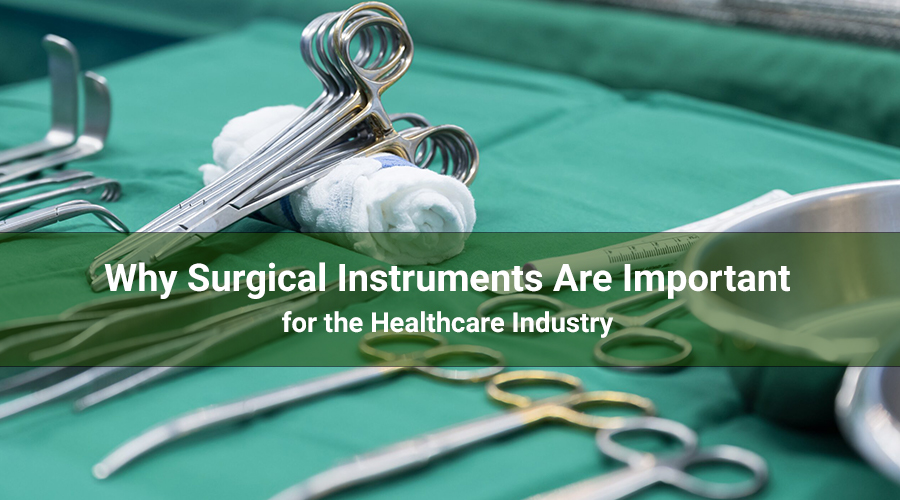
Surgical instruments are essential tools in the healthcare industry. These tools are used by doctors, nurses, and surgeons in operations and medical procedures to save lives and improve patient health. Without surgical instruments, many medical treatments and surgeries would not be possible. This article explains the importance of surgical instruments in healthcare, how they work, and why high-quality instruments are crucial for patients and healthcare providers.
What Are Surgical Instruments?
Surgical instruments are tools designed to help medical professionals perform surgeries and medical procedures. They cut, hold, clamp, stitch, and examine body tissues. These instruments come in many shapes and sizes, each made for a specific task during surgery. Some common surgical instruments include:
- Scalpels and Scissors: Used to make cuts during surgery.
- Forceps and Clamps: Used to grip and hold tissues or blood vessels.
- Retractors: Used to hold back organs or tissues to give the surgeon a clear view.
- Needles and Sutures: Used to stitch wounds or close incisions after surgery.
- Probes and Endoscopes: Used for examining inside the body during surgery.
Each instrument has a specific role, and they all work together to help surgeons perform delicate and complex procedures with precision.
Why Are Surgical Instruments So Important?
1. They Ensure Accuracy in Surgeries
Surgical instruments allow doctors to be precise during operations. In surgery, even a small mistake can lead to serious problems. High-quality instruments help doctors make clean cuts, control bleeding, and avoid damaging healthy tissues. For example, in brain surgery, precise instruments are needed to avoid harming critical areas of the brain. Having the right tools ensures that surgeries are successful and patients recover well.
2. They Improve Patient Safety and Outcomes
The quality of surgical instruments directly affects how well a surgery goes and how quickly a patient recovers. When instruments are sharp, reliable, and easy to use, surgeries take less time, and there are fewer risks for the patient. A clean and precise cut heals faster and reduces the chance of infection. On the other hand, using poor-quality instruments can cause complications like excessive bleeding, infections, or slower recovery.
3. They Are Vital Across Many Medical Fields
Surgical instruments are used in a wide range of medical specialties, from general surgery to specialized fields like orthopedics, gynecology, and cardiology. Each field has its own set of instruments designed for specific procedures. For example:
- Orthopedic Surgery: Involves tools like bone saws and drills for repairing fractures or replacing joints.
- Gynecology: Uses instruments like curettes and hysteroscopes for examining and treating women’s health issues.
- Cardiology: Requires special instruments for heart surgeries and other cardiovascular procedures.
The availability of the right instruments for each specialty ensures that doctors can provide the best care to their patients.
4. They Reduce Surgical Risks and Complications
Every surgery carries some risk, but using the right surgical instruments helps minimize those risks. Instruments that are designed to be easy to handle and are specific to the surgery type allow doctors to work more confidently. For example, in minimally invasive surgeries (like laparoscopic surgery), specialized instruments are used to perform the procedure with small incisions. This reduces the risk of complications, shortens recovery time, and leaves smaller scars.
5. They Help Prevent Infections
In hospitals, preventing infections is a top priority. Surgical instruments are designed to be sterilized easily so they can be reused safely. After each surgery, instruments are cleaned and sterilized to kill any bacteria or viruses that could cause infection. Instruments made from high-quality materials, like stainless steel, can be sterilized many times without losing their sharpness or effectiveness. This is important to keep patients safe and reduce the risk of infections after surgery.
6. They Drive Technological Progress in Healthcare
As technology advances, so do surgical instruments. Modern healthcare uses advanced tools like robotic surgery systems, laser devices, and endoscopes that allow doctors to perform surgeries with greater precision and less trauma to the patient. For example, robotic surgery instruments give surgeons better control and flexibility during complex procedures, leading to better results and faster patient recovery. The continuous improvement of surgical instruments is essential for advancing healthcare and improving patient care.
The Financial Benefits of Quality Surgical Instruments
1. Cost Savings for Healthcare Facilities
High-quality surgical instruments may seem expensive initially, but they save money over time. Durable instruments last longer and don’t need to be replaced as often, reducing long-term costs for hospitals and clinics. Additionally, reliable instruments reduce the chances of surgical errors and complications, which can be costly for both the patient and the healthcare provider. By investing in good instruments, healthcare facilities can improve patient care while keeping costs under control.
2. Supporting the Healthcare Industry
The surgical instruments industry is a key part of the healthcare sector. It creates jobs, drives research and development, and generates income for manufacturers. The demand for better and more advanced instruments pushes companies to innovate and improve their products. This benefits the entire healthcare system by providing better tools for doctors and ultimately better care for patients.
Challenges in the Surgical Instruments Industry
Despite their importance, the surgical instruments industry faces several challenges:
- Low-Quality and Fake Instruments: Many counterfeit or low-quality instruments on the market can be dangerous to use. Healthcare providers need to be careful when buying instruments to ensure they come from trusted manufacturers.
- Proper Maintenance and Sterilization: Surgical instruments need to be carefully maintained and sterilized to ensure they work properly and are safe to use. Improper care can lead to contamination, which can cause infections or instrument failure during surgery.
- Training and Handling: Even the best instruments are only as good as the people using them. Doctors and healthcare staff need proper training to handle, clean, and store instruments correctly. Without the right skills, even high-quality instruments can be misused or damaged.
Conclusion
Surgical instruments are the backbone of the healthcare industry. They are critical for performing surgeries safely and effectively. From improving surgical precision to reducing patient recovery time, these tools play a vital role in modern medicine. Investing in high-quality surgical instruments is essential for ensuring patient safety, supporting medical advancements, and running healthcare facilities smoothly. As healthcare continues to advance, the need for reliable, precise, and innovative surgical instruments will remain as important as ever.







